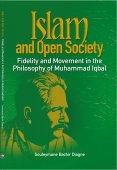Islam and Open Society. Fidelity and Movement in the Philosophy of Muhammad Iqbal
Keywords:
Islam , Open Society, Fidelity, Philosophy , Muhammad IqbalSynopsis
In the atmosphere of suspicion and anger that characterizes our time, it is a joy to hear the voice of Iqbal, both passionate and serene. It is the voice of a soul that is deeply anchored in the Quranic Revelation, and precisely for that reason, open to all the other voices, seeking in them the path of his own fidelity. It is the voice of a man who has left behind all identitarian rigidity, who has ’broken all the idols of tribe and caste’ o address himself to all human beings. But an unhappy accident has meant that this voice was buried, both in the general forgetting of Islamic modernism and in the very country that he named before its existence, Pakistan, whose multiple rigidities – political, religious, military – constitute a continual refutation of the very essence of his thought. But we all need to hear him again, citizens of the West, Muslims, and those from his native India, where a form of Hindu chauvinism rages in our times, in a way that exceeds his worst fears. Souleymane Bachir Diagne has done all of us an immense favor in making this voice heard once again, clear and convincing.
Downloads
References
Baal-i-Jibriil [Gabriel’s Wing], English translation by Naeem Sidiqqi, (available online at the Iqbal Academy Pakistan site: http://www.allamaiqbal.com/).
L’Aile de Gabriel, French translation by Mirza Saïd-Uz-Zafar Chaghtaï and Suzanne Bussac, Paris: Albin Michel, 1977.
Le Message de l’Orient, French translation by Eva Meyerovitch with Mohammed Achena, Paris: Les Belles Lettres, 1956.
Les secrets du soi, followed by Les mystères du Non-Moi, French translation by Djamchid Mortazavi and Eva Meyerovitch, Paris: Albin Michel, 1989.
Letters and Writings of Iqbal, compiled and edited by B.A. Dar, Karachi: Iqbal Academy, 1967.
Letters of Iqbal to Jinnah, Lahore: 1963.
Message from the East, English translation by M. Hadi Hussain (available online at the Iqbal Academy Pakistan site: http://www.allamaiqbal.com/).
Reconstruire la pensée religieuse de l’islam, French translation by Eva Meyerovitch, Paris: Maisonneuve, 1955 Javid Nama, English translation by Arthur J. Arberry, (available online at the Iqbal Academy Pakistan site: http://www.allamaiqbal.com/).
Speeches and Statements of Iqbal, compiled by A. R. Tariq, Lahore, 1973.
The Development of Metaphysics in Persia: A Contribution to the History of Muslim Philosophy, London: Luzac and Company, 1908.
The Mysteries of Selflessness: A Philosophical Poem, English translation from the Persian by Arthur J. Arberry (available online at the Iqbal Academy Pakistan site: http://www.allamaiqbal.com/).
The Reconstruction of Religious Thought in Islam, London, Humphrey Milford: Oxford University Press, 1934.
The Secrets of the Self, English translation by Reynold A. Nicholson (available online at the Iqbal Academy Pakistan site: http://www.allamaiqbal.com/).
Abduh, Muhammad [Abdou, Mohamed], Rissâlat al Tawhîd ou Exposé de la religion musulmane, French translation by B. Michel and Cheikh Moustapha Abdel Razik, Paris: Librairie orientaliste Paul Geuthner, 1984.
Abdur Rahim, Khawaja, Iqbal, the Poet of Tomorrow, Lahore: Abdul Hameed Khan,1968.
Ali, Sayyid, Amir, The Spirit of Islam: A History of the Evolution and Ideals of Islam with a Life of the Prophet, London: Christophers, 1922.
Al-Ghazâlî, Abu Hamid, The Incoherence of the Philosophers, English translation by Michael E. Marmura, Provo: Brigham Young University Press, 1997.
Al-Farâbî, Abu Nasr, The Book of Religion, in The Political Writings, «Selected Aphorisms» and Other Texts, edited and translated by Charles E. Butterworth, Ithaca,NY: Cornell University Press, 2001.
Al Mujahid, Sharif, Quaid-i-Azam Jinnah: Studies in Interpretation, Karachi: Quaid-iAzam Academy, 1981.
Anawati George C., Gardet, Louis, Mystique musulmane. Aspects et tendances expériences et techniques, Paris: Vrin, 1986 (4th ed).
Bayart, Jean-François, The Illusion of Cultural Identity, English translation by Steven Rendall, Janet Roitman, Cynthia Schoch, and Jonathan Derrick, Chicago: The University of Chicago Press, 2005.
Berger, Gaston, Phénoménologie du temps et prospective, Paris: Presses Universitaires de France, 1964.
Bergson, Henri, Creative Evolution, trans. into English by Arthur Mitchell, New York: Henry Holt and Company, 1911.
Bouamrane, Cheikh, Gardet, Louis, Panorama de la pensée islamique, Paris : Sindbad, 1984.
Cixous, Hélène, L’Indiade ou l’Inde de leurs rêves, Paris: Théâtre du Soleil, 1987.
Collective, Les Religions d’Abraham et la science, Paris : Maisonneuve et Larose, 1996.
Deleuze, Gilles, Nietzsche and Philosophy, translation by Hugh Tomlinson, London: Athlone Press, 1983.
Fakhry, Majid, A History of Islamic Philosophy, New York: Columbia University Press, 1970.
Foucault, Michel, ‘What is Enlightenment?’ in Ethics: Subjectivity and Truth. The Essential Works of Michel Foucault 1954-1984, Volume One, trans. Robert Hurley et al., Allen Lane, The Penguin Press, 1997.
Gaonkar, Dilip, (Editor), Public Culture, Alter/Native Modernities, Vol. 11, no 1, Winter 1999: Duke University Press.
Hallaj, Hussain Mansûr, al-, Dîwân de Halladj, French translation and presentation by Louis Massignon, Paris: Seuil, 1981.
Hussain, Riaz, Towards Pakistan: The Politics of Iqbal, Lahore: Islamic book service, 1977.
Kane, Cheikh Hamidou, Ambiguous Adventure, translation by Katherine Walker, New York: Walker and Company, 1963.






